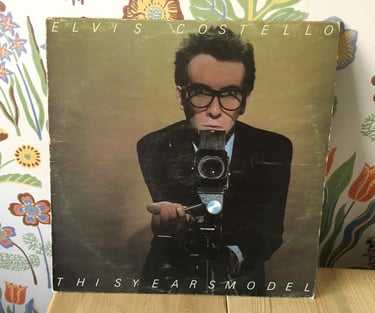From the Crate #2 'This Year's Model'
In which I review old albums from a 3 crate vinyl haul in 2021. #2 Review of Elvis Costello's 'This Year's Model'
In late 70’s England three ‘singer-songwriters’ (for want of a better term) of a similar ilk emerged in the sticky space between anarchic spit-drenched punk and what would become the big-hair, synthesized new-romantic movement. Joe Jackson came out of the gates fully formed with a fantastic debut in Look Sharp (a personal favorite). Then there was Graham Parker – near forgotten now – with his catchy reggae-inflected guitar rhythms. Lastly there was Elvis Costello – of the three, the one in least need of introduction. What did these guys have in common? Well, the songwriting for one: all three wrote clever, incisive socially-aware lyrics, primarily driven by the backing of a guitar-band sound that would, in a few years to come, become oddly, if only temporarily, dated. However, the biggest thing these three guys had in common was the anger and punchiness of their vocal delivery. They sang with the same forceful sneer (not unlike a curated Highway-61 Dylan), their voices almost indistinguishable from each other. These were edgy, irritated young men, whose words were pushed right up into our faces telling us that listening to their clever lyrics was something we could not avoid, even if we wanted to. We better listen, or else we might be missing out on something important.
It would be wrong to suggest that of the three only Costello emerged from this moment with any credibility. Parker, though never again reaching his 70’s nadir, had a decent career, and Joe Jackson had a massive break out in the 80’s with Night and Day, and then went on to do whatever the fuck he wanted (which wasn’t necessarily what anyone else wanted). However, it’s hard to dispute that the music of Elvis Costello’s first three albums was perhaps the most consistently outstanding of the time, and arguably remains the only music of these three that still holds up. Costello may be divisive as a person, or even an acquired musical taste but it’s near impossible to say that he wasn’t a big influence on the bands that shaped the decades to come. Costello forged a sound and a created the template for clever, sarcastic jabs at the ever shifting ‘powers that be’. Bands that were perhaps less ‘political’ but surely influenced by him include Police, Echo and Bunnymen, U2 and perhaps later bands like Pulp, Verve and Arctic Monkeys, amongst many others, I’m sure.
So that brings me to my Elvis Costello crate find, a very welcome addition to my growing collection – his second album This Year’s Model (1978). What stands out almost immediately when going back and listening to a record like this is the clarity of the lyric writing, the sharp intonations, and while the voice might sound faux-American in delivery, the words appear utterly British on paper. Perhaps it’s the sarcasm, the cynicism and the willing, almost masochistic self-deprecation? Perhaps it’s the humour? Whatever it is, Costello delivers with some bite, and he doesn’t leave you wondering. A song like Radio Radio informs us of the decline, in Costello’s eyes, of radio in the UK. But Costello is aware enough to give us a full picture. ‘I wanna bite the hand that feeds me,’ he tells us with glee. And then he goes ahead and does it, a gesture that surely contributed to the lack of the song’s commercial success.
There’s more than a hint of Bruce Springsteen in Costello’s songwriting at this stage of his career. But while Bruce told us about American life through losing jobs, steamy factory towns, driving across the desert in open roofed cars and screen doors slamming, Costello was telling us what it meant to be the equivalent in what was developing into a dirty, stuffy, conservative Britain: ‘Snivelling governments; ladies’ smalls; walking through troubled times; with the boys from the Mersey and the Thames and the Tyne’. In many ways This Year’s Model is not as political as what would come later, particularly in songs like Oliver’s Army, but there is a lot to grab onto in this man’s storytelling. And even if you’re not a fan, it’s hard not to appreciate him as a bona-fide wordsmith. For me, it’s not a stretch to see a link between Elvis Costello and someone like George Orwell. Both seem driven by insatiable curiosity, but equally appalled and fascinated as to where that curiosity leads them.
In This Year’s Girl, with its jolting percussion, Costello rhymes ‘synthesizers’ with ‘tranquilizers’ and ‘body building prizes’. Pump it Up, a punky dance tune with a fist-raising mini-anthem, is a commentary on seventies rock and roll excess (‘Down in the pleasure centre, hell-bent or heaven sent’), which you never quite get the feeling that Costello was a part of. Little Triggers boasts a signature Elvis Costello sound, a kind of bassy, faux-country put through a reggae filter that, in true Costello mode, seems to point the finger at a finger pointer. Fuck you for telling me to fuck me, kind of thing. It’s a song I’ve heard him do a bunch of times, but kudos to him, I never really tire of it.
You’ve got to love the lyrics of Hand in Hand: ‘Don’t you know I got the bully boys out; changing someone’s facial design.’ Angry, what? And it brings me back to the earlier comparisons with his contemporaries. Graham Parker asks the Lord not to ask him questions and Joe Jackson puts out the question: is she really going out with him? (That guy? That dickwad?) You can’t help but feel that there is somewhat of a chip on the collective shoulders here. But it only feeds into a creative pool and, well, the truth is, I wouldn’t be writing this review if I had never felt like rearranging a bully’s face or killing an ex’s new boyfriend. Fuck you, everyone, right?
The reggae infused I don’t want to go to Chelsea – along with Pump it up – was the obvious hit from the album. Chelsea was a song that always confused me. It wrangles with the cynical ideas surrounding beauty, photographic models and allusions to Chelsea pretentious fashion, but it seems to emphasize, in this mind anyway, a narrative that speaks of an outsider. One gets the impression that Elvis Costello is the bullied kid, with the eternal chip on his shoulder, who will always be an outsider-nerd looking in. The girls are pretty, sure, but I will never get them. (Not really true though, is it?) And fuck them for being so unavailable. I’m not saying it’s misogyny, to be clear, just alluding to an unjustified resentment that I am sure I too indulged in as a young man.
And that love resentment seems to be the most predominant theme that this reviewer picks up in This Year’s Model. In Living in Paradise you get the feeling that the protagonist of the song can’t quite live in the paradise he espouses. It’s that ‘too good to be true’ mantra that can’t have Costello quite being satisfied and has him ‘looking through the keyhole of his lover’s bedroom door’. In Lipstick Vogue, perhaps the most different sounding tune on the whole record he suggests that ‘love is just a tumor, you’ve got to cut it out’. Listening to the record all these years later it’s hard not to think that Costello had been jilted by some form of romantic expectation not long before the making of this record. But perhaps it’s some kind of other unfulfilled expectation that is driving him? I could research this, but googling interests me less than listening for myself and picking up the witty bitterness that underlines much of this record. It feels like that thing, the young person thing, of trying to explain emotion with intellect. But there’s no bridge to be found here. It all just manifests as frustrated desire. But what a creative fuel! What a motivator! One hopes that Costello has mellowed in later years, but his music still feels relevant, to these ears. Whenever I hear Costello, I still feel his voice is a call to attention. I want to listen. I want to believe.
I’m not sure – though many will disagree – this album is as good as his first and third albums. I am not sure these are the songs I would direct the Costello initiate to. My Aim is True had the wonderfully out-of-fashion Alison and came on the back of the arrival moment Watching the Detectives. And when Oliver’s Army hit the airwaves in 1979 on Armed Forces – a song that both sonically and lyrically blew my lid off – it was no longer a secret that Costello was an exceptional writer and an intellect of a very new kind. You sensed at that moment he had fully delivered, and that he was a force to be reckoned with, and would remain so. You felt that Elvis Costello knew what he was – something akin to an upstart, British Randy Newman. Only, unlike Newman, Elvis Costello, as his preposterous name suggested, was also a larger than life rock star too. And you sense he already knew this, long before he got a record contract. Turns out, all these years later, his aim may well have been true…
BITE THE HAND THAT FEEDS ME ‘ELVIS COSTELLO – THIS YEAR’S MODEL’




